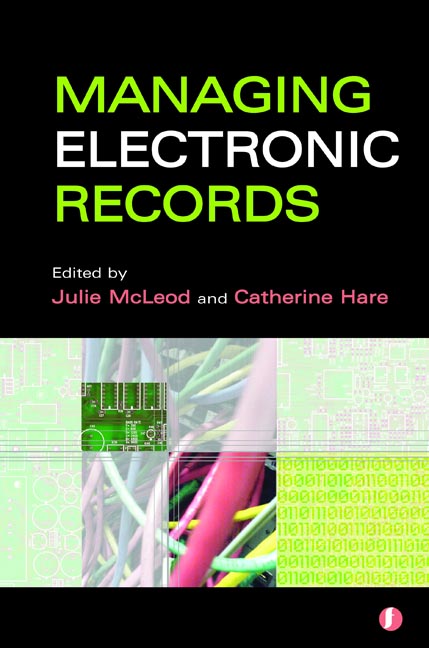Book contents
- Frontmatter
- Contents
- The editors and contributors
- Preface
- 1 The wild frontier ten years on
- 2 The use of standards and models
- 3 Metadata matters
- 4 Digital preservation – ‘the beautiful promise’
- 5 Research in electronic records management
- 6 Technologies for preservation
- 7 Legal issues
- 8 Ethics and electronic recordmaking
- 9 Competencies – the asset that counts most: on developing human talents as a prerequisite for successful EDRM changes
- 10 Records management: two case studies from the French private sector
- 11 Implementing a solution for electronic recordkeeping in the public sector
- 12 Playing the long game – creating and maintaining the links in the value chain
- Index
7 - Legal issues
Published online by Cambridge University Press: 08 June 2018
- Frontmatter
- Contents
- The editors and contributors
- Preface
- 1 The wild frontier ten years on
- 2 The use of standards and models
- 3 Metadata matters
- 4 Digital preservation – ‘the beautiful promise’
- 5 Research in electronic records management
- 6 Technologies for preservation
- 7 Legal issues
- 8 Ethics and electronic recordmaking
- 9 Competencies – the asset that counts most: on developing human talents as a prerequisite for successful EDRM changes
- 10 Records management: two case studies from the French private sector
- 11 Implementing a solution for electronic recordkeeping in the public sector
- 12 Playing the long game – creating and maintaining the links in the value chain
- Index
Summary
Introduction
This chapter is about international laws pertaining to electronic records. Our main focus is to provide a clear picture as to how recordkeeping laws have evolved over time – from the pre-technology era when paper was the sole method of recordkeeping, to the first several decades of computer usage, when paper and electronic records often existed side by side, and finally to the age of the internet and the revolution in e-business, when commercial and other business transactions often occur in a totally paperless environment. Special emphasis will be devoted to the model laws of the United Nations Commission on International Trade Law, as they have been the single most significant factor in the development of international laws connected with electronic records during the past ten years.
Much has been written about the Sarbanes-Oxley Act, which was signed into law in the US in 2002, in the aftermath of such scandals as Enron–Arthur Andersen and WorldCom. This new law imposes rigour and transparency on the management of electronic financial data. Other countries have introduced legislation to address electronic recordkeeping; thus, this chapter aims to take a global perspective concerning some of the key legal issues affecting electronic records and their management.
Let's begin with establishing a basic understanding of the law's interest in organizational recordkeeping. While the law can be bewilderingly complex, it really boils down to a few simple principles. The law's primary interest is that organizations keep and maintain records such that the ends of justice may be served. More specifically, this means that organizations must manage their records in a manner that enables them to demonstrate that:
• the organization is conducting its business with honesty and integrity, and in a manner consistent with the public interest as well as its own
• the organization's records are properly maintained and preserved, in case they may be needed as evidence in government investigations, litigation, audits or other legal proceedings
• the organization is in full compliance with all applicable laws and regulations, in letter, spirit and good faith.
- Type
- Chapter
- Information
- Managing Electronic Records , pp. 101 - 114Publisher: FacetPrint publication year: 2005
- 2
- Cited by



